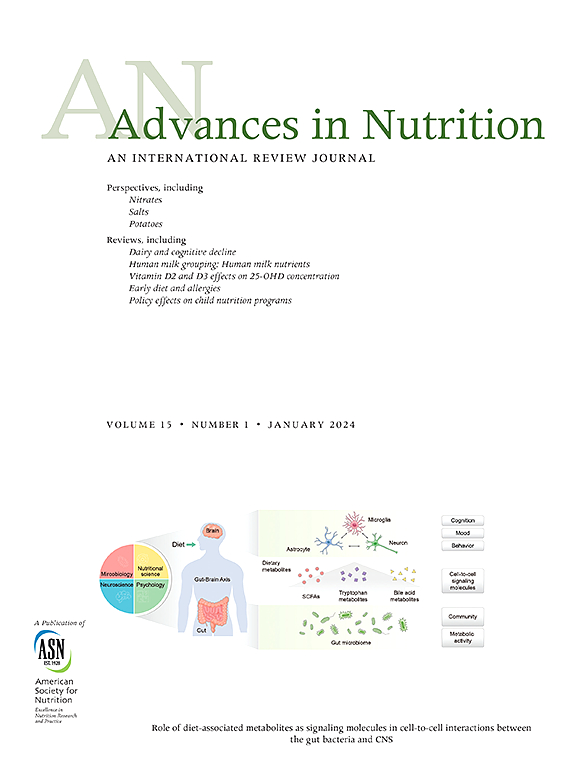A Scoping Review of Artificial Intelligence for Precision Nutrition
IF 9.2
1区 医学
Q1 NUTRITION & DIETETICS
引用次数: 0
Abstract
With the role of artificial intelligence (AI) in precision nutrition rapidly expanding, a scoping review on recent studies and potential future directions is needed. This scoping review examines: 1) the current landscape, including publication venues, targeted diseases, AI applications, methods, evaluation metrics, and considerations of minority and cultural factors; 2) common patterns in AI-driven precision nutrition studies; and 3) gaps, challenges, and future research directions. Following the Preferred Reporting Items for Systematic reviews and Meta-Analyses extension for Scoping Reviews (PRISMA-ScR) process, we extracted 198 articles from major databases using search keywords in 3 categories: precision nutrition, AI, and natural language processing. The extracted literature reveals a surge in AI-driven precision nutrition research, with ∼75% (n = 148) published since 2020. It also showcases a diverse publication landscape, with the majority of studies focusing on diet-related diseases, such as diabetes and cardiovascular conditions, while emphasizing health optimization, disease prevention, and management. We highlight diverse datasets used in the literature and summarize methodologies and evaluation metrics to guide future studies. We also emphasize the importance of minority and cultural perspectives in promoting equity for precision nutrition using AI. Future research should further integrate these factors to fully harness AI’s potential in precision nutrition.

人工智能在精准营养领域的应用综述
背景:随着人工智能(AI)在精密营养中的作用迅速扩大,需要对近期研究和潜在的未来方向进行范围综述。目的:本综述审查了:(1)目前的情况,包括出版场所、目标疾病、人工智能应用、方法、评估指标以及对少数民族和文化因素的考虑;(2)人工智能驱动的精准营养研究的常见模式;(3)差距、挑战及未来研究方向。方法:按照系统评价优选报告项目和meta分析扩展范围评价(PRISMA-ScR)流程,从主要数据库中提取198篇文章,检索关键词分为三类:精确营养关键词、人工智能关键词和自然语言处理关键词。结果:提取的文献显示,自2020年以来,人工智能驱动的精确营养研究激增,约75% (n=148)发表。它还展示了多样化的出版景观,这些研究主要集中在饮食相关疾病,如糖尿病和心血管疾病,同时强调健康优化,疾病预防和管理。我们强调不同的数据集,并批判性地讨论方法和评估指标,以指导未来的研究。重要的是,我们强调少数民族和文化方面在提高卫生技术和促进公平方面的重要性。未来的研究应深化这些因素的整合,以充分利用人工智能在精准营养方面的潜力。意义声明:本范围综述提供了精确营养研究中人工智能的最新进展,不仅将范围扩大到人工智能方法及其应用,还评估了出版场所、目标疾病、使用的数据集以及少数民族和文化因素,这些因素在以前的研究中大多被忽视。此外,由于讨论部分提出了许多空白和挑战,本综述显着提高了对人工智能在精确营养中的作用的理解,并为未来的研究提供了新的见解。
本文章由计算机程序翻译,如有差异,请以英文原文为准。
求助全文
约1分钟内获得全文
求助全文
来源期刊

Advances in Nutrition
医学-营养学
CiteScore
17.40
自引率
2.20%
发文量
117
审稿时长
56 days
期刊介绍:
Advances in Nutrition (AN/Adv Nutr) publishes focused reviews on pivotal findings and recent research across all domains relevant to nutritional scientists and biomedical researchers. This encompasses nutrition-related research spanning biochemical, molecular, and genetic studies using experimental animal models, domestic animals, and human subjects. The journal also emphasizes clinical nutrition, epidemiology and public health, and nutrition education. Review articles concentrate on recent progress rather than broad historical developments.
In addition to review articles, AN includes Perspectives, Letters to the Editor, and supplements. Supplement proposals require pre-approval by the editor before submission. The journal features reports and position papers from the American Society for Nutrition, summaries of major government and foundation reports, and Nutrient Information briefs providing crucial details about dietary requirements, food sources, deficiencies, and other essential nutrient information. All submissions with scientific content undergo peer review by the Editors or their designees prior to acceptance for publication.
 求助内容:
求助内容: 应助结果提醒方式:
应助结果提醒方式:


